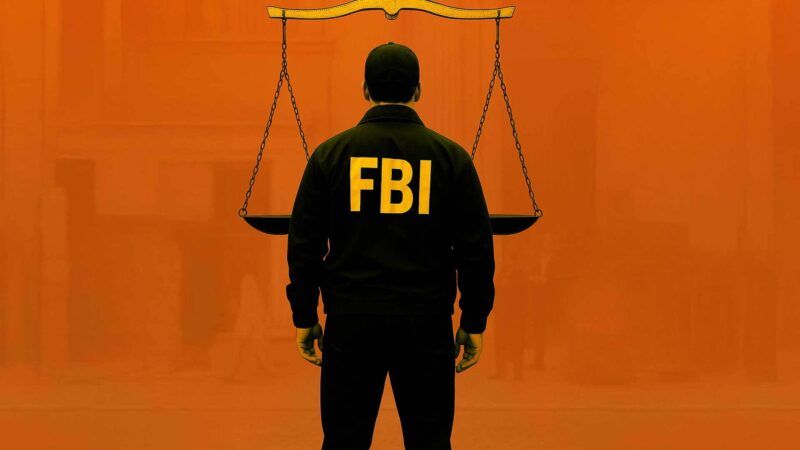Don't Let Rights-Violating Federal Agents Dodge Accountability
Plus: The Texas Chain Saw Massacre on wax.

The good guys won a welcome victory at the U.S. Supreme Court last week when the justices ruled 9–0 that an innocent family's lawsuit against the federal government over a wrong house raid may now proceed. At the same time, however, the ruling was a depressing reminder that all too many people face all too many legal obstacles when it comes to suing federal agents for misconduct.
Let's start with the good news.
You’re reading Injustice System from Damon Root and Reason. Get more of Damon’s commentary on constitutional law and American history.
The case of Martin v. United States arose in 2017 when the FBI conducted a predawn raid on Curtrina Martin's Georgia home. Except the agents were at the wrong house. They were supposed to be at a different address on a different block. Their search and arrest warrants were made out for 741 Landau Lane, the location of a suspected gang lair. Yet Martin lived on 756 Denville Trace. That glaring mistake by the federal officers led them to wreck Martin's home and traumatize her family.
So, Martin sued for damage under the Federal Tort Claims Act (FTCA). But the lower court tossed out her civil suit, arguing that it was barred by the terms of the FTCA, which only permits such lawsuits under certain circumstances. The Supreme Court's ruling last week in Martin v. U.S. said that the civil suit may in fact move forward under the FTCA, and sent the case back to the lower court for further proceedings.
Writing in concurrence, Justice Sonia Sotomayor, joined by Justice Ketanji Brown Jackson, provided the lower court with some guidance about just why and how the feds should lose the case on remand. "It is hard to see how [FBI Special Agent Lawrence] Guerra's conduct in this case, including his allegedly negligent choice to use his personal GPS and his failure to check the street sign or house number on the mailbox before breaking down Martin's door and terrorizing the home's occupants, involved the kind of policy judgments" that the FTCA actually covers, Sotomayor wrote. In other words, there are not only solid reasons for the lawsuit to move forward, Sotomayor explained, but there are even better reasons for Martin to win and receive compensation.
That's the good news. Now for the depressing part.
Think about the timeline in Martin's case. The feds invaded her home and held her at gunpoint while her terrified seven-year-old son cowered in a different room, all because the officers could not be bothered to perform basic due diligence—are we actually at the right house?—before breaking down the (wrong) door and detonating a flash grenade. This deplorable and entirely avoidable misdeed occurred eight years ago, which means that this family has been fighting an uphill battle for redress and accountability from the government for the better part of a decade. And their fight is still not over yet, even after securing an important win at the highest court in the land.
To say the least, it should not be so hard—and it should definitely not take so long—to hold the government to account for such blatant wrongdoing.
The Martin case is also a dispiriting reminder of the Supreme Court's own indefensible role in shielding rights-violating federal officers from facing justice in other contexts. In Egbert v. Boule (2022), for example, the Supreme Court refused to allow a federal civil rights lawsuit to proceed against a border patrol agent who was facing plausible allegations that he had violated a man's constitutional rights.
The dire result of that ruling, Sotomayor observed in dissent, is that Customs and Border Patrol "agents are now absolutely immunized from liability" from that kind of federal civil rights lawsuit, "no matter how egregious the misconduct or resultant injury." Not exactly a reassuring thing to read about federal immigration enforcement officers these days, is it?
Too many judges have been too deferential for too long in the face of plausible claims of government malfeasance. Hopefully, Martin v. U.S. will someday be remembered for its part in helping to turn the tide in favor of greater accountability.
Odds & Ends: The Texas Chain Saw Massacre on Wax
The Texas Chain Saw Massacre (1974) is an often-imitated but never duplicated horror masterpiece that retains its power to unsettle more than fifty years after it was first released. And it turns out that the film's original score remains wonderfully disquieting too. Last year, the great Waxwork Records, which specializes in issuing pristine new editions of horror and cult movie soundtracks, released The Texas Chain Saw Massacre Original Motion Picture Score "for the first time in any format." I've taken to playing my copy in the background sometimes when I'm writing, and I'm here to say that it adds a pleasing touch of sonic dread to the workday. This album is not for everyone, of course, but if you're a fan of the flick, it's definitely worth a listen.


Show Comments (38)